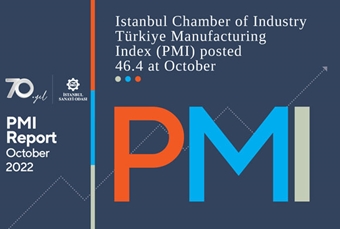News
October 2022 Report of ICI Türkiye Manufacturing PMI and Türkiye Sector PMI Report Released
- 01.11.2022
- News

The Istanbul Chamber of Industry Türkiye Manufacturing PMI, which is the fastest and most reliable reference accepted in manufacturing industry performance of the economic growth, fell to 46.4 in October of 2022. The headline PMI posted below the 50.0 no-change mark for the eighth consecutive month and signalling a solid moderation in the health of the sector. In fact, the latest slowdown was the most pronounced since May 2020. Central to the latest moderation in business conditions was a further softening of new orders, which eased for the thirteenth month running amid a lack of demand.
According to Istanbul Chamber of Industry Türkiye Sector PMI Report, new orders slowed down in all sectors except for land and sea vehicles with increased demand for the fourth time in the last six months during October. The sharpest loss of momentum was recorded in the textile, non-metallic mineral products, and clothing and leather products sectors. Output decreased in eight out of ten sectors. Employment increased in four sectors, with the strongest increase in machinery and metal products. Input price inflation rose only in the sectors of chemicals, plastics and rubber.
The October 2022 period of Istanbul Chamber of Industry (ISO) Türkiye Manufacturing PMI (Purchasing Managers’ Index) survey, which is the fastest and reliable reference accepted in manufacturing industry performance of the economic growth was announced. Any figure greater than 50.0 indicates overall improvement of the sector. The headline PMI dipped to 46.4 in October from 46.9 in September, thereby posting below the 50.0 no-change mark for the eighth consecutive month and signalling a solid moderation in the health of the sector. In fact, the latest slowdown was the most pronounced since May 2020.
Central to the latest moderation in business conditions was a further softening of new orders, which eased for the thirteenth month running amid a lack of demand. A similarly sharp slowdown in new export orders was recorded. Demand weakness fed through to an easing in output over the month, albeit one that was the least marked since May. Manufacturers responded to softer new orders by scaling back their purchasing activity and employment in October. In particular, the easing of staffing levels accelerated to the fastest since May 2020. The slowdown in input buying meant that pressure on supply chains was reduced, helping lead to a shortening of delivery times. The improvement in vendor performance was the first in 34 months and most pronounced since September 2014. Input costs and output prices continued to increase sharply in October, although in both cases rates of inflation softened from the previous survey period. Higher input costs mainly reflected currency weakness, although there were also reports of rises in prices for energy and raw materials. In turn, charges increased as firms passed on higher input costs to customers.
Commenting on the Istanbul Chamber of Industry Türkiye Manufacturing PMI survey data, Andrew Harker, Economics Director at S&P Global Market Intelligence, said: “Subdued demand conditions kept the Turkish manufacturing sector on the back foot in October, with weakness in international demand increasingly to the fore. With requirements to satisfy new work easing, firms looked to scale back both employment and purchasing activity, the latter providing some respite for suppliers and enabling them to speed up their deliveries to the greatest extent in just over eight years, thus lessening one of the obstacles to growth in the sector.”
Output decreased in eight of the 10 monitored sectors
According to Istanbul Chamber of Industry Türkiye Sector PMI Report for October, new orders slowed down in all sectors except for land and sea vehicles with increased demand for the fourth time in the last six months during October. The sharpest loss of momentum since September was recorded in the textile, non-metallic mineral products, and clothing and leather products sectors. Output dropped in eight out of ten sectors in October, with the strongest in textiles, non-metallic mineral products, and clothing and leather products sectors. The land and sea vehicles saw the strongest growth since August 2021, while a more moderate output increase was observed in the food products sector.
Employment increased in four sectors. However, the number of sectors posting an increase was the lowest for the second time since the first pandemic wave in the April-May 2020 period. The sector with the strongest increase in employment was machinery and metal products sector. It was followed by the basic metal industry, land and sea vehicles, chemical, plastic and rubber sectors, respectively. The sharpest slowdown in employment was recorded in textile products.
In October, the increase in input prices slowed down in nine of the 10 monitored sectors. The two sectors with the mildest general cost pressures were the basic metal industry and machinery and metal products, respectively. The fastest increase in both input and final product prices was recorded in the non-metallic mineral products sector. Input price inflation rose only in the sectors of chemicals, plastics and rubber. In the food products sector, finished product prices inflation increased. Again, while the lead times of suppliers were shortened in four sectors, the most significant decrease was felt in textile. In four sectors, the increase in lead times was lower compared to September. While backlogs showed a general drop, especially in the textile products sector, it increased at the highest rate since January 2020 in the land and sea vehicles sector.
You can find attached the Istanbul Chamber of Industry Türkiye Manufacturing PMI and Sector PMI October 2022 reports.